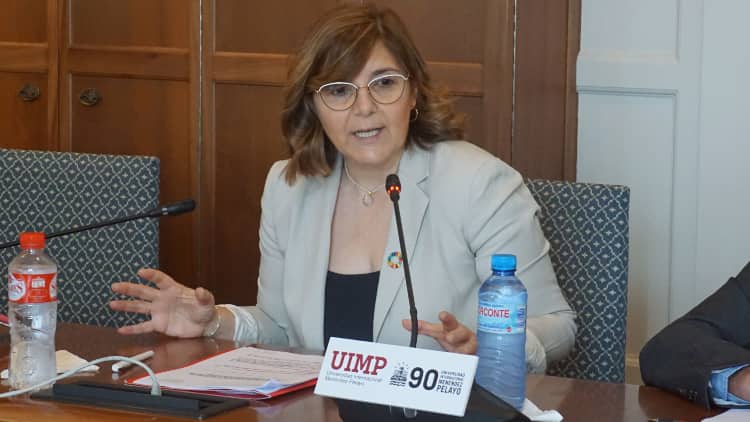The Diplomat
The State Secretary for International Cooperation, Pilar Cancela, said yesterday that during its Presidency of the European Council in the second half of 2023, Spain will advocate strengthening the EU’s approach to Latin America.
Cancela yesterday opened the course ‘Latin America and the European Union: democracy, development and renewal of the social contract. Challenges for the Spanish Presidency of the EU 2023’, which is being held as part of the Summer Courses of the Menéndez Pelayo International University (UIMP).
Speaking to journalists, she said that the EU must look “perhaps more than ever” towards Latin America, and stressed that development cooperation in that region must now be “much more present” to prevent the current global crisis from causing setbacks in the “many, many achievements” made in that part of the world.
The State Secretary said that putting Latin America “at the centre” of the EU’s attention will be one of the objectives that Spain’s Presidency of the Union will pursue, and affirmed that Spain has been working on development cooperation with Latin America and the Caribbean for “more than 40 years”, that this cooperation is now “consolidated” and that it has a “well-established and well-structured structure”.
In his opinion, work should focus on responding to the global economic crisis resulting from the pandemic and the situation arising from Vladimir Putin’s invasion of Ukraine, which, he said, is causing the “inequality and vulnerability gaps” that already existed in Latin America to become “much more entrenched”.
She also believes that the EU should work to ensure that Latin American citizens regain the confidence in institutions and in the democratic system that, in some cases, they may have lost when they saw that some of their countries’ responses to the crisis generated by the pandemic have not been “inclusive”, as she believes they should be in order to ensure that “no-one is left behind”.
The State Secretary for International Cooperation insisted that the “bi-regional dialogue” between Europe and Latin America should be “strengthened much more”, in the current geopolitical and economic context. She added that Europe has the “obligation” to be there because “it represents completely different values” from those of these other economic blocs.
urthermore, he believed that the EU’s view of Latin America cannot be reduced to “three or four countries” that “are of interest for dialogue and political confrontation” because the region is “much more”.
Cancela’s participation in the opening ceremony was followed by the lecture “Democracy in Latin America”, by Esther del Campo, Professor of Political Science at the Complutense University of Madrid. This was followed by the round table discussion “Democracy and the social contract in Latin America”, moderated by the Director of the Carolina Foundation, José Antonio Sanahuja, with the participation of Esther del Campo herself; Natalia Tini, Director of International Parliamentary Organisms of the Senate of Argentina; and Francisco J. Verdes-Montenegro, researcher in the area of Studies and Analysis of the Carolina Foundation.
Afterwards, Josep Borrell, High Representative of the Union for Foreign Affairs and Security Policy and Vice-President of the European Commission, gave the conference “Geopolitical Europe and the other transatlantic relationship”.







